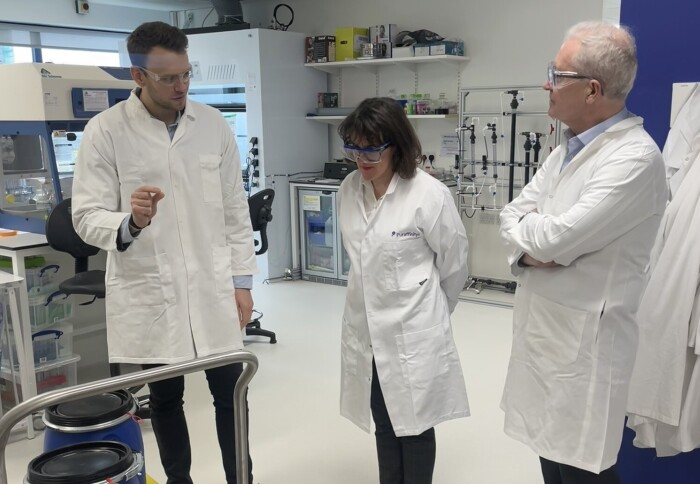Rachel Blake MP visits White City to see Imperial student startup
by Nazza Ahmed

Rachel Blake MP visiting Puraffinity's labs and meeting Co-Founder Henrik Hagemann alongside Imperial's President Professor Hugh Brady
MP for Cities of London and Westminster Rachel Blake visited the White City Deep Tech Campus and Imperial student startup Puraffinity.
Hosted by Imperial’s President, Professor Hugh Brady, the new MP for Cities of London and Westminster Rachel Blake heard about Imperial’s role in supporting innovation, entrepreneurship and growth as part of the WestTech Corridor.
President Brady highlighted the Corridor as a key initiative to drive forward ambitions to create growth by capitalising on Imperial’s research and innovation clusters across West London. Rachel saw how the White City Deep Tech Campus and White City Innovation District are creating the conditions for businesses of all sizes to flourish – with wide ranging access to cutting edge equipment, facilities and expertise.
WestTech Corridor and Paddington Life Sciences – creating an ecosystem for investment, growth and job creation
As one of the Labour Party's mission delivery champions for the London region, Rachel heard about how Imperial’s recent investments and partnerships will boost the WestTech Corridor and grow the economy locally and across the UK. This includes a major £150 million investment in a prime industrial site in Old Oak. The investment will enable innovators in areas such as CleanTech, BioTech and MedTech to stay and scale in West London. She also heard about Imperial’s new partnership with Bruntwood SciTech, which will lead to a £200 million life sciences innovation centre at the White City Deep Tech Campus.
Based in Rachel’s constituency of Cities of London and Westminster, President Brady highlighted Paddington Life Sciences as a key part of the Corridor. The new clinical life sciences cluster will bring together industry, academia, the NHS and local communities to drive forward improved health and wellbeing in areas such as infectious disease, immunology, acute medicine and diagnostics and biomarkers across Rachel’s constituency and beyond. This includes supporting the cluster based around Imperial’s St Mary’s Hospital Campus alongside Imperial College Healthcare NHS Trust and key partners.

President Brady spoke about how these investments and partnerships will enable the WestTech Corridor to create a vibrant new ecosystem of globally competitive scale that is a powerful engine for investment, inclusive economic growth and job creation and a model for urban transformation all over the world.
Visit to Puraffinity – supporting growth through Imperial’s entrepreneurial ecosystem
Rachel toured the labs and offices of Imperial student startup Puraffinity, based in Scale Space. She met with Chief Product and Innovation Officer and Co-Founder Henrik Hagemann and heard about how Imperial’s entrepreneurial ecosystem has supported companies like Puraffinity from ideation to incubation and growth.
Rachel saw first-hand how Puraffinity is developing precision technologies which remove toxic “forever chemicals” known as PFAS from water. PFAS persists in the environment for many years, and have been linked to multiple health issues, including cancer. Puraffinity provides a solution the world’s ever-growing PFAS problem as its technology consistently and reliably removes PFAS from water in a much more cost-effective manner compared with conventional treatments.

The company was formed in 2015 by Henrik Hagemann and Gabi Santosa, at the time both Master’s students in Imperial’s Department of Bioengineering. The founders took part in several Imperial entrepreneurship programmes, including the Venture Catalyst Challenge, WE Innovate, and Undaunted’s climate accelerator programme, now known as The Greenhouse. Puraffinity were among the first residents of the White City Incubator in 2017 before graduating to larger lab facilities at Scale Space in 2021 after a period of accelerated growth.
In September, Puraffinity completed their £17 million Series A funding round, which will enable them to scale up their manufacturing capabilities from product to market, so that their PFAS-capturing material can meet demand, including treatment of drinking water and environmental remediation.
Article text (excluding photos or graphics) © Imperial College London.
Photos and graphics subject to third party copyright used with permission or © Imperial College London.
Reporter
Nazza Ahmed
Office of the President